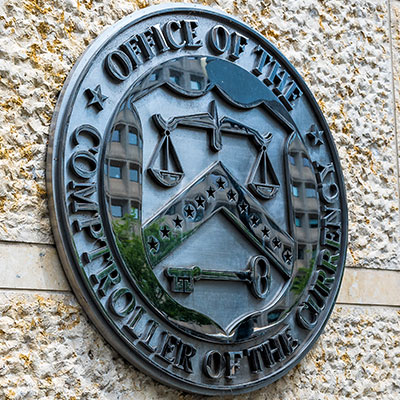Table of Contents
What is the Office of the Comptroller of Currency (OCC)?
 An independent bureau of the U.S. Department of the Treasury, the Office of the Comptroller of Currency (OCC) charters, regulates, and supervises all national banks and federal savings associations as well as federal branches and agencies of foreign banks.
An independent bureau of the U.S. Department of the Treasury, the Office of the Comptroller of Currency (OCC) charters, regulates, and supervises all national banks and federal savings associations as well as federal branches and agencies of foreign banks.
As detailed on its website, www.occ.gov, the OCC identifies as the preeminent prudential supervisor that:
- adds value through proactive and risk-based supervision;
- is sought after as a source of knowledge and expertise; and
- promotes a vibrant and diverse banking system that benefits consumers, communities, businesses, and the U.S. economy.
Its stated mission is: “To ensure that national banks and federal savings associations operate in a safe and sound manner, provide fair access to financial services, treat customers fairly, and comply with applicable laws and regulations.” The OCC carries out its mission by:
- issuing banking rules and regulations and providing legal interpretations and guidance on banks’ corporate decisions that govern their practices.
- visiting and examining the banks it oversees.
- evaluating applications for new bank charters or branches; for other proposed changes in the corporate structure of banks or their activities; and from foreign banks that wish to operate in the United States under an OCC charter.
- imposing corrective measures, when necessary, on OCC-governed banks that do not comply with laws and regulations or that otherwise engage in unsafe or unsound practices.
- protecting consumers by making sure banks give fair access and equal treatment to customers and comply with consumer banking laws.
The people who lead the OCC are experienced professionals, and experts in bank examination, law, risk management, economics, finance, accounting, organizational management, governance, human resources, communications, and technology. They collaborate to help ensure the safety and soundness of our federal banking system and to help make the OCC one of the best places to work in the federal government. Michael J. Hsu became Acting Comptroller of the Currency on May 10, 2021. The Comptroller of the Currency is the administrator of the federal banking system and head of the OCC.
The Comptroller also serves as a Director of the Federal Deposit Insurance Corporation and a member of the Financial Stability Oversight Council and the Federal Financial Institutions Examination Council.
 History of the OCC
History of the OCC
The OCC was created as a bureau of the U.S. Department of the Treasury on February 25, 1863. President Lincoln signed The National Currency Act establishing the Office of the Comptroller of the Currency, charged with responsibility for organizing and administering a system of nationally chartered banks and a uniform national currency. In June 1864, the legislation underwent substantial amendment and became known as the National Bank Act. Modified and supplemented over the years, the National Bank Act continues to provide the basic governing framework for the national banking system today.
The first Comptroller of the Currency was Hugh McCulloch, formerly the president of the Bank of Indiana. During McCulloch’s 22 months in office, 868 national banks were chartered and no failures occurred. The first Comptroller recommended major changes in the banking law. The resulting National Banking Act of 1864 remains the foundation of the national banking system. After heading the OCC for less than two years, McCulloch resigned to serve two terms as Secretary of the Treasury—first under Lincoln and then under President Chester Arthur.